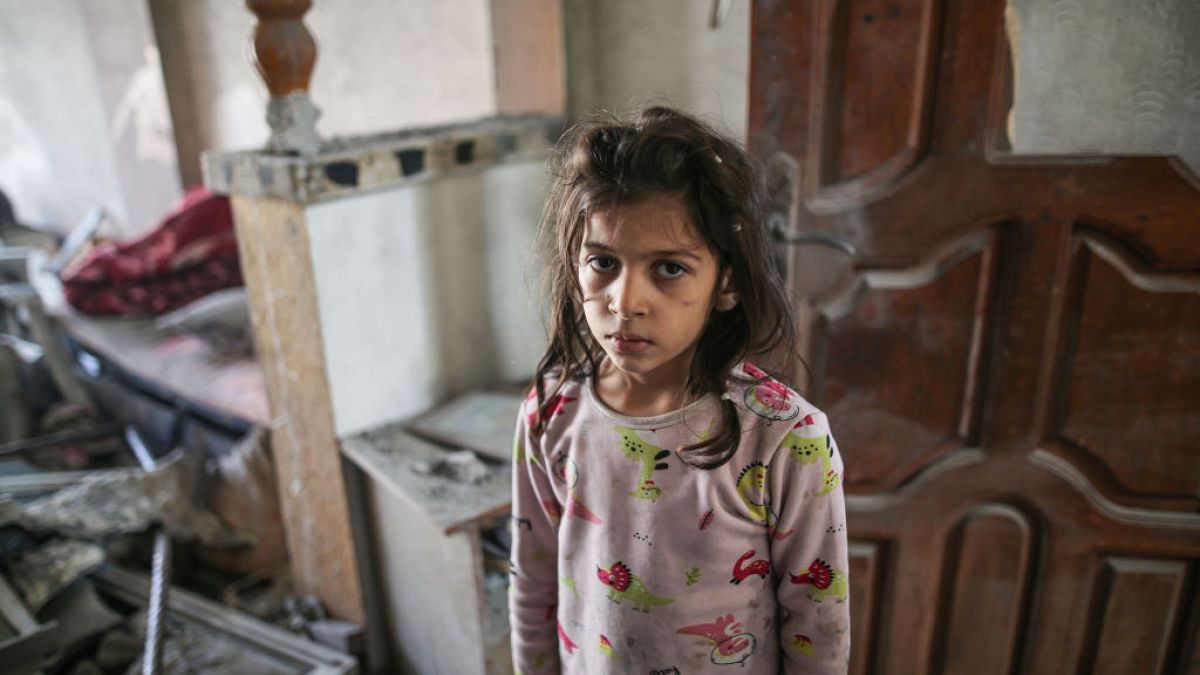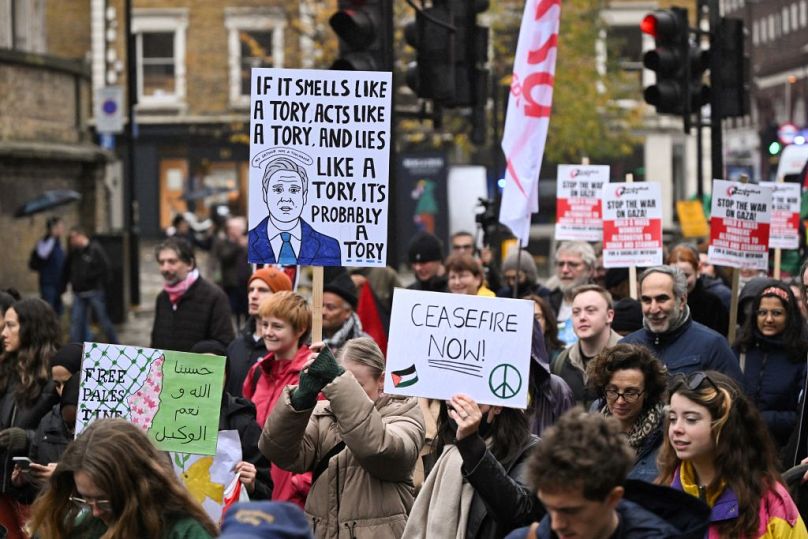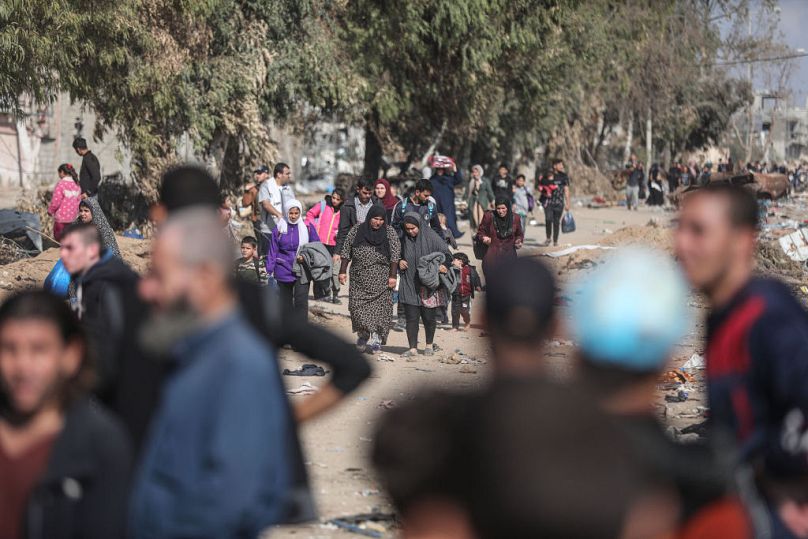The latest developments from the Israel-Hamas war.
UNRWA condemns ‘horrifying’ school strikes
The head of the UN agency for Palestinian refugees (UNRWA) has denounced the "horrifying” strikes on schools housing displaced people in Gaza.
An official from the Hamas Health Ministry had previously said at least 50 dead were killed in one of these attacks.
“These attacks cannot become commonplace, they must stop. A humanitarian ceasefire cannot wait any longer,” UNRWA Commissioner-General Philippe Lazzarini wrote in a post on X - formerly Twitter.
Lazzarini also called for an immediate ceasefire, saying such a pause “cannot wait any longer”.
Olaf Scholz: ‘urgent need to improve the humanitarian situation' in Gaza
There is an "urgent need to improve the humanitarian situation" in the Gaza Strip, German Chancellor Olaf Scholz has said during a telephone conversation with Israeli Prime Minister Benjamin Netanyahu.
The chancellor “underlined the urgent need to improve the humanitarian situation of the inhabitants of the Gaza Strip,” according to a statement. “Humanitarian ceasefires could contribute to a substantial improvement in care for populations,” he added.
UK: Thousands repeat ceasefire calls
Thousands of people demonstrated again on Saturday in the United Kingdom to support the Palestinians and demand a ceasefire in Gaza.
In London, rather than a large procession like the previous five Saturdays, numerous rallies and parades were organised.
Hundreds of people demonstrated near the office of Labour opposition leader Keir Starmer, who is criticised for his refusal to call for a ceasefire.
Like Prime Minister Rishi Sunak, though, he is calling for pauses to allow the delivery of humanitarian aid.
Other protests were also organised in several British cities.
Last Saturday, around 300,000 people marched in London according to the Metropolitan police, the largest demonstration organised in the British capital since 7 October.
Since then, London’s police force have recorded 386 arrests in connection with the conflict, including 253 in connection with demonstrations.
Hamas Health Ministry announces more than 80 dead in two strikes on refugee camp
The Hamas health ministry has reported the deaths of more than 80 people in two separate Israeli strikes on a UN-run refugee camp in the northern Gaza Strip.
Neither the Israeli army nor the UN agency for Palestinian refugees (UNRWA) immediately commented.
The first strike left at least 50 dead "at dawn, at the al-Fakhoura school", in the Jabalia camp, where displaced people were staying, a ministry official told AFP.
Images posted on social media showed bodies, some covered in blood, others in dust, on the floors of the building, where mattresses had been installed under school tables.
In the second strike, the ministry announced the death of 32 members of the same family, including 19 children, by releasing the list of names of the Abou Habal family.
At the beginning of November, the Hamas government announced more than 200 dead and hundreds injured in Israeli bombings of the Jabalia refugee camp, during various strikes spread over three days.
Jabalia is the largest refugee camp in the Gaza Strip, where more than 80% of the inhabitants are refugees or descendants of refugees who left their homes in 1948 when the State of Israel was established.
All are run by UNRWA which manages the eight camps in the small territory.
In Jabalia, they manage 26 schools and two health centres.
According to the UN agency, at least 71 displaced people were killed and 573 injured while sheltering in some of the 154 structures it opened in the Gaza Strip.
These shelters now accommodate some 813,000 displaced people, according to UNRWA.
No ‘meaningful’ pause before release of hostages - US official
A pause in fighting between Israel and Hamas and a "significant" increase in humanitarian aid to the Gaza Strip will occur when hostages taken by the militant group are released, a senior US official in Bahrain has said.
The situation in the Palestinian territory, shelled and besieged by Israel for 43 days after an attack by the Palestinian Islamist movement on its soil, is "horrible" and "intolerable", Brett McGurk, the White House Coordinator for the Middle East and North Africa said.
But "the influx of humanitarian aid, the influx of fuel (and) a pause in the fighting will take place when the hostages are released," he added during the annual security forum organised by the International Institute for Strategic Studies (IISS).
"The release of a large number of hostages would lead... to a significant pause in the fighting and a massive influx of humanitarian aid," McGurk added.
The UN Security Council has called for "urgent and prolonged humanitarian pauses" - but Israel refuses any ceasefire until all hostages have been released.
Ayman Safadi, the Jordanian minister of foreign affairs said, while at the same event, that it is “unacceptable” to link humanitarian pauses to the question of hostages.
Safadi also spoke on behalf of the leaders of Arab countries, reiterating their call for an immediate ceasefire.
President of the European Commission opposed to ‘forced displacement’ of Palestinians
The President of the European Commission, Ursula von der Leyen, has said that she is opposed to the "forced displacement" of Palestinians after meeting Egyptian President Abdel Fattah al-Sissi in Cairo.
“I discussed the ongoing humanitarian crisis in Gaza with President al-Sissi. I thanked Egypt for its key role in providing and facilitating humanitarian aid to vulnerable Palestinians. We agree on the principle of no forced displacement of Palestinians and a political horizon based on a two-state solution,” von der Leyen wrote on X (formerly Twitter).
The President of the European Commission then went to Sinai to visit the Rafah crossing point, inspect humanitarian aid and visit injured Palestinians in hospital.
She flew into Al-Arich airport, the site where international aid has been piling up for weeks, before reaching Rafah, the border post between Egypt and Gaza.
Rafah remains the only opening into the Gaza strip and aid is still only trickling in.
Shifa hospital evacuated - except 120 patients and premature babies
Gaza health officials say many patients, medical staff and the displaced have left the region's largest hospital, which was taken over by Israeli forces earlier in the week.
Palestinian officials and the Israeli military offered conflicting versions about what prompted the mass exodus from Shifa Hospital.
Health officials say they received an evacuation order from the military on Saturday morning, while the military said it had offered safe passage to those hoping to leave. Before the departure, several thousand people, including medical patients in serious condition, were trapped in Shifa in dire conditions.
Some 120 patients and premature babies remain at the hospital, according to Gaza health officials.
Several doctors are remaining in Shifa to care for these patients, officials at the establishment told AFP.
For days, hospitals in the Gaza Strip have said they no longer have enough fuel. After strikes and shootings on ambulances, particularly at the gates of al-Chifa, their drivers say they can no longer operate the vehicles.
In recent days, during their raid on the hospital, Israeli soldiers destroyed several departments with explosives, including the ground floor of the surgery department.
The Israeli army said it has found weapons and military equipment hidden around the hospital and in a vehicle outside, as well as the laptop it says belonged to a Hamas militant. It also released videos of what it says is a tunnel, which is still being studied. The military’s claims could not be independently verified.
But Israel has yet to present proof of a Hamas command and control centre it previously said is underneath the hospital.
Limited internet and phone access returns to Gaza
The Palestinian telecommunications company Paltel has announced that phone and internet services were partially working again across Gaza after fuel was delivered to restart generators that power the networks.
NetBlocks, a group tracking internet outages, confirmed that “internet connectivity is being partially restored” in the Gaza Strip.
On Thursday, Paltel announced that all communication services, including landline connection, mobile network and Internet connection, dropped due to a lack of fuel.
The next day, Israel agreed to allow two tanker trucks of fuel, equaling 60,000 litres, into Gaza each day.
A US State Department official said 10,000 litres of the daily intake will be used to power the enclave’s communications network.
Before this week, Israel had completely prohibited fuel from entering Gaza, fearing it could be commandeered by Hamas and used against them.
International criminal court is gathering info on alleged crimes
International Criminal Court Prosecutor Karim Khan says that his office has received “a significant volume of information and evidence” about alleged crimes committed during the Israel-Hamas war.
Khan did not elaborate on the nature of the information his office has received.
He commented in a written statement on Friday confirming that South Africa, Bangladesh, Bolivia, Comoros, and Djibouti had made official state referrals to the court about the “Situation in the State of Palestine,” which his office has been investigating since March 2021. South Africa announced the referral on Thursday.
The ICC investigation dates back to the last major Israel-Hamas war in 2014 but also includes the ongoing conflict in Gaza.
Khan says his prosecution office “will continue its engagement with all relevant actors, whether national authorities, civil society, survivor groups or international partners, to advance this investigation.”
He also says he will “continue my efforts to visit the State of Palestine and Israel to meet with survivors, hear from civil society organisations and engage with relevant national counterparts.”


